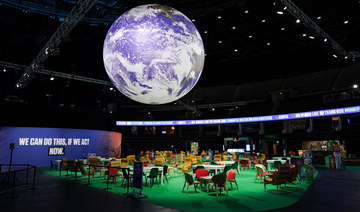ABU DHABI: Saudi Arabia helped break the logjam to reach a deal at last week’s crucial climate change talks at COP26, the Kingdom’s Energy Minister Prince Abdulaziz bin Salman told a conference in the UAE capital Abu Dhabi.
Prince Abdulaziz said that contrary to allegations from environmental groups, a Saudi proposal on wording originally agreed at the Rome G20 conference last month had helped save the day in Glasgow.
The final declaration at COP26 saw compromise reached on the key issue of coal usage, with some phrases changed in order to allow a deal encompassing the biggest coal consumers, India and China.
“That language was introduced by us,” the energy minister said at the ADIPEC 2021 energy forum, indicating that the wording had been used by Saudi negotiators and accepted at the G20 leaders’ summit.
He was responding to a question from moderator John Defterios about allegations that Saudi Arabia’s stance on climate change amounted to “greenwashing” and skepticism whether the Kingdom's ambitious climate change strategy could be effectively implemented.
“Because we are a major producer of oil and gas, I can understand the skepticism, but I would refer those skeptics to what we agreed just two days ago. The new agreement talks about committing countries to coming out every year and reporting on what they actually have accomplished and what they have done,” said the minister.
He pointed out that the Saudi and the Middle East green initiatives are going to be annual events, where the Kingdom’s efforts toward mitigating global warming would be judged alongside regional peers.
“This region will become a role model for what we mean by sustainable development,” he added.
Saudi Arabia’s strategy for energy transition centers on three pillars, he said: Energy security, sustainable economic development and measures to combat climate change.
To applause from the audience in the opening session of the forum, he highlighted the achievements of the OPEC+ in countering the effects of the COVID-19 pandemic last year.
“The 23 responsible countries delivered, more remarkable than any other group on planet Earth, including the central bankers. They delivered sustainability, predictability and transparency, in a long term plan looking 1.5 years ahead. They have delivered a stable, less volatile oil market,” he said.
Prince Abdulaziz added that climate change policy should look at “emissions, not fuel sources,” and should seek to mitigate all forms of greenhouse gas, not just CO2. He also said that climate change policies should take into account the differing national and economic circumstances of all countries in the world, especially less developed countries.
ADIPEC 2021 began on Monday Nov. 15 and will run to Nov. 18, with the participation of ministers, leaders and experts in the energy sector from around the world.



















